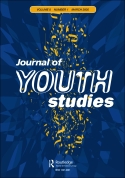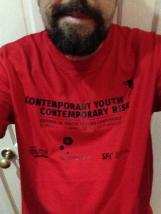Having missed out on going to the Journal of Youth Studies conference in Copenhagen this year, I asked Professor Robert MacDonald to write a short piece on his experience there for the blog. He kindly agreed to do so. He works at the Social Futures Institute at Teeside University and has written extensively on young people. You can find out more about him here
Things can be better
Reflections from the Contemporary Youth and Contemporary Risks: Journal of Youth Studies conference, Copenhagen April 2015
Robert MacDonald, Teesside University
——————————————————————————————————————————————————-
I was a participant in, and co-organiser of, the third Journal of Youth Studies conference, held this year in Copenhagen at the end of March/ beginning of April. Alan Mackie has kindly asked me to write some notes and reflections on the conference – so first some background.
The Journal of Youth Studies

Even though I speak as a long-standing Deputy Editor, I think it is fair to say that the Journal of Youth Studies (JYS) is probably the world’s leading journal of critical, (mainly) sociological studies of young people and youth issues. Led since its conception by Professor Andy Furlong of Glasgow University, it now stretches to ten issues per year, has a strong impact factor, a well-established international advisory board, a high quality threshold and a global reach. It regularly includes contributions from Australasia, the Nordic countries and Canada, as well as the UK (which provide the main hubs for academic research in Youth Studies) as well from scholars working in a wide range of countries outside of these centres.
JYS Conferences
There have been two JYS conference prior to this one; in Glasgow in 1997 and, following a long gap, Glasgow again in 2013. The 2015 conference in Copenhagen indicates the editors’ plan to host these conferences biennially. Proposals are currently sought for the 2017 conference. Smart money is on this taking place in Australia – but this is not yet decided. Hosting a conference like this, especially after the success of the Copenhagen conference, is a major commitment. The heavy weight of the organisation of this conference was carried by Dr Tea Bengtsson (University of Copenhagen) and Dr Signe Ravn (the Danish National Centre for Social Research); whose proposal to organise and host this conference was the one accepted by the JYS editorial board. Enormous credit is due to them for the professional way they handled every aspect of the conference.
The Copenhagen Conference: an international event
The previous conference in Glasgow featured circa 120 presentations with around 250 participants. Few papers were rejected. We anticipated perhaps a slightly larger conference for Copenhagen; around maybe 150 papers. In the event, we were inundated. The Scientific Committee made decisions on over 450 papers (abstracts); an exponential increase on the last conference. Eventually, over 270 papers were presented at the conference, with around 350 participants from over 40 countries. We knew people had come from many corners of the world but, for this blog post, I had a closer look. Unsurprisingly, the UK dominated with over 100 participants followed by Denmark itself (55), the other Nordic countries (49), the rest of Europe (East and West, 70), Australasia (29), and, North America (28). In addition, conference delegates included researchers from, for instance, Hong Kong, India, Nigeria, South Korea, Israel, Ghana, Mexico and Thailand. This really was an international conference.
Left Photo – Prof Jon Kvist Keynote
Right Photo – Dr Tea Bengtsson and Dr Signe Ravn introduction to Keynote
The five key note lectures covered questions of: belonging in a globalised world (Anita Harris); sub-culture and post-subculture (Paul Hodkinson); researching teenage sexuality (Rachel Thomson); youth and inequality (Jon Kvist) and the contemporary risks of precarity and underemployment (given by Andy Furlong, Tracy Shildrick and myself, to open the conference). In addition there was a panel debate about the value or otherwise of the concept of ‘social generation’ (Dan Woodman, Steven Roberts and Alan France), ‘meet the author’ lunches, special editors’ panels and a space given to Discover Society, which will run a special issue on the conference very soon.
The conference covered the gamut of Youth Studies. The papers were organised into twelve themes, with papers reasonably evenly spread between them:
- transitions;
- work, welfare and unemployment;
- education;
- gender and sexualities;
- health;
- crime, deviance and criminal justice;
- youth culture and subculture;
- politics and resistance;
- exclusion and marginalisation;
- place and space;
- methods;
- and youth work.
What makes for a good conference?
People will give different answers. For me it is some combination of: hearing new things about theory, method and findings in the field; learning better ‘trade craft’, for instance from seeing how others present their work; the privilege of (re)visiting cities out of one’s normal tracks; and socialising with old colleagues – and getting to meet new ones. Here planning, organisation and catering are crucial. Tea and Signe were wonderful hosts (and very well supported by a legion of student helpers). Conference participants were extremely well looked after. The academic programme really was packed and taxing – but supported by thoughtful, generous and quirky catering (e.g. the baskets of ‘help yourself’ fruit and Snickers bars outside the afternoon keynote lectures as energy levels flagged was a great touch and the stalls providing free hot dogs at the evening reception was a funny and appreciated idea). The conference dinner was glorious, held out at the Carlsberg brewery (with wine that never ran out – and a DJ who got even better when he let me plug my IPod in at the end of the night). It is difficult to imagine better organisation and hosting of a conference. Several participants that I spoke to, including a cadre of younger sociologists new to the world of Youth Studies, described it as the best conference that they had ever been to.
The Copenhagen conference achieved a nice balance and mix between the formal and the informal, creating, for me, a strong sense of communality and shared intellectual endeavour. It is often the case with academic conferences that a few gems are hidden amongst the dross of more mediocre papers. It is difficult to recall a duff of dreary presentation from Copenhagen. Of course it helps that this was a conference about youth and for youth specialists. We all knew and were interested in what each other was talking about, more or less. This isn’t always the case with general sociology conferences where the meaning and relevance of some papers can sometimes be opaque. There were very many excellent papers presented at Copenhagen.
Things can be better: Youth Studies & Social Policy
Looking back, a month after the event, one of the key note papers is one that really stands out for me – not only in terms of the importance of its substance but also in respect of the beauty and style of its delivery. This was the lecture given by Professor Jon Kvist from Roskilde University in Denmark. Its title sounds a little dry! ‘Youth and Inequality: Nordic Public Policies Analysed through a Life Course Perspective on Social Investments’. In short, Kvist tried to demonstrate how and why the Nordic countries have been less affected by the post-crash crisis than most other EU countries. Thus, his approach was comparative but it also contained a dynamic, life-course model that focused in on the way that the social welfare state is paid into and pays back at different points in a typical life course (e.g. in respect of health, work, education, and family life), so helping to provide the sort of social security and stability that has been drastically undermined by austerity programmes. In other words, Kvist laid before us the secrets of the success of the Nordic welfare model, the one so envied by many in the UK. Too infrequently are mainstream Social Policy questions brought together with Youth Studies. The talk was extremely well received. In the immediate questions, two participants (one Canadian, one Australian) vied with each other for who got to take Professor Kvist home to lecture their own Prime Ministers!
My contribution to open the conference, with Tracy and Andy, had been to outline the predominance of new risks – of precarity and underemployment – that face young people in the UK and Europe more widely. We noted how in the UK, perhaps surprisingly, it is young people who are the demographic group that has fared worst in respect of rising poverty over the past decade. We reported how many agree that these are unusually hard times for youth.
We showed that this generation is the first since the mid-20th century that faces a greater chance of social descent than of social ascent. Though not intended as such, Jon Kvist’s paper was a wonderful antidote and response. As we ourselves had noted, youth unemployment rates in European states are staggeringly varied (ranging from 50+% to less than 7%). Governments can act. People can act. There are alternatives. Things can be better. This is one of the things of which I was reminded by this fantastic conference.
(All photographs in the blog from Professor MacDonald, except top photo of Copenhagen, taken from www.canstockphoto.com)
Categories: Youth Studies





Leave a comment